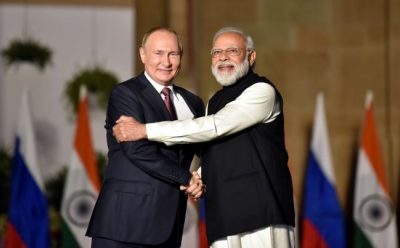India-Russia Relations: A Wealth of Opportunities to Deepen Economic Engagement and Foster Enduring Partnerships
Investment prospects for Indians in the Russian Federation

All Global Research articles can be read in 51 languages by activating the Translate Website button below the author’s name (only available in desktop version).
To receive Global Research’s Daily Newsletter (selected articles), click here.
Click the share button above to email/forward this article to your friends and colleagues. Follow us on Instagram and Twitter and subscribe to our Telegram Channel. Feel free to repost and share widely Global Research articles.
Big Tech’s Effort to Silence Truth-tellers: Global Research Online Referral Campaign
***
As President of the Indian Business Alliance (IBA) and Founder of The Imperial Tailoring Co., Sammy Kotwani offers comprehensive insights on the evolving dynamics of Indian investment prospects in the Russian Federation. He also discusses, in this interview, aspects of business challenges and roadblocks in the context of geopolitical changes and competition as well as the current economic cooperation between India and Russia. Here are the interview excerpts:
How would you characterize the geopolitical changes on investment prospects for Indians in Russian Federation?
Geopolitical changes have significantly influenced investment prospects for Indians in the Russian Federation. The strategic partnership between the two countries has created favorable conditions for Indian investors, with a renewed focus on economic cooperation and enhanced bilateral relations. This has opened new avenues for Indian businesses to explore investment opportunities in sectors such as energy, technology, pharmaceuticals, and infrastructure.
What are your estimation of the current Russia’s economic presence in India? And how does it look like in the private sector there?
Russia’s economic presence in India is noteworthy, especially within the private sector. There has been a visible upward trajectory in Russian investments and collaborations in key sectors such as defense, nuclear energy, and strategic infrastructure. The private sector in India has increasingly engaged in joint ventures and technology transfers with Russian counterparts, fostering mutually beneficial partnerships.
By the way, do you see an increasing trend, particularly, in trade between the two countries? What are the supporting factors here in the bilateral trade?
The trade between India and Russia has, indeed, been experiencing an upward trend, backed by several prominent factors. Enhanced diplomatic relations, the implementation of preferential trade agreements, and increased cooperation in sectors such as aerospace, agriculture, and pharmaceuticals have been instrumental in fostering robust bilateral trade ties.
Naturally there must be a number of challenges and roadblocks, problems and pitfalls in policy and, of course, business approach in relation to Indian players in the Russian Federation. Is it possible to comment on them?
Challenges and roadblocks are inherent in any international business engagement. An understanding of regulatory frameworks, cultural nuances, and local business practices is crucial for Indian players in the Russian Federation. It is essential to address issues related to bureaucratic hurdles, legal complexities, and market entry barriers. A harmonized approach to policy frameworks and regulatory norms will be pivotal in mitigating these challenges and fostering a conducive business environment.
Do these still persist in the entrepreneurial activities and operations during these few years? What do you suggest, in terms, rules and regulations to facilitate business relations?
Persistent efforts are required to streamline and optimize entrepreneurial activities and operations in the Russian Federation. Clear and transparent regulations, simplified procedures for obtaining permits and licenses, and efforts to minimize bureaucratic red tape will provide a conducive environment for Indian businesses to thrive.
In the context of the current changes, what else could stimulate business innovations and initiatives to attract more Indian investment to Russia?
To stimulate business innovations and initiatives and attract more Indian investment to Russia, proactive measures such as the establishment of special economic zones, investment protection mechanisms, and collaborative research and development efforts can play a transformative role. Additionally, facilitating technology transfers, promoting joint ventures, and encouraging skill development programs will further bolster business prospects for Indian investors in Russia.
And finally, what are your perspectives, for instance, on geopolitical competition in relation to, say, India and China and probably other external players in Russia’s market landscape?
In the context of geopolitical competition, it is imperative to emphasize that India and Russia share a time-tested bilateral relationship based on mutual trust and strategic cooperation.
While geopolitical dynamics in the region continue evolving, India and Russia maintain a strong foundation of partnership and collaboration. The convergence of interests and shared commitment to stability and economic progress underpins the enduring relationship between the two countries. Furthermore, India’s engagement with Russia complements its relations with other external players, including China, through a balanced and pragmatic approach aimed at promoting mutual prosperity and stability in the region.
In conclusion, the evolving landscape of Indo-Russian relations presents a wealth of opportunities for both countries to deepen economic engagement and foster enduring partnerships. By harnessing the potential for collaboration across diverse sectors, India and Russia can pave the way for sustained economic growth and shared prosperity.
*
Note to readers: Please click the share button above. Follow us on Instagram and Twitter and subscribe to our Telegram Channel. Feel free to repost and share widely Global Research articles.
Kester Kenn Klomegah, who worked previously with Inter Press Service (IPS), Weekly Blitz and InDepthNews, is now a regular contributor to Global Research. He researches Eurasia, Russia, Africa and BRICS. His focused interest areas include geopolitical changes, foreign relations and economic development questions relating to Africa. As a versatile researcher, he believes that everyone deserves equal access to quality and trustworthy media reports.
Featured image is from InfoBrics

